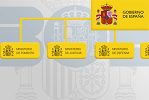Marriage
Content
What is marriage?
The civil-law definition of marriage is a stable union between two persons of the same or opposite sex, established in accordance with the requirements of the civil legislation.
Marriage takes effect in civil law from the time of solemnisation. These effects apply both to the individuals concerned (the spouses’ rights and obligations) and to their estates (the matrimonial property regime). Marriages must be registered in the Civil Registry to be fully recognised
What is a marriage licence?
Any Spaniard can marry in or outside Spain in the form laid down by the Civil Code or in the religious form legally provided for. If both parties are foreigners they can marry in Spain in accordance with the same provisions as for Spaniards or the provisions of the personal law of either party.
Accreditation for authorisation to solemnise a marriage
Under the Civil Registry legislation, those who wish to enter into a marriage must first provide evidence, through documentation or a certificate, that:
- they meet the no impediment requirements, and
- there are no impediments to the marriage, or that any such impediments have been waived,
- there is no other obstacle, as outlined in the Civil Code. In such cases, a ruling will be issued authorising the solemnisation of the marriage.
The Department of Justice’s legal officer, notary, Civil Registry officer, or any other designated functionary handling the documentation or certificate may, when necessary, request from public administrations or social initiative entities dedicated to promoting and protecting the rights of persons with disabilities the provision of human, technical, and material support. Such assistance will facilitate the issuing, interpretation and receipt of the consent of one or both parties entering into the marriage.
Only in exceptional cases where any of the contracting parties has a health condition which, obviously, categorically and substantially, could prevent them from giving consent to marriage despite the support measures, will a medical opinion be sought about their ability to give consent.
Where the marriage act or documentation is processed?
The marriage certificate will be processed before a notary at the place of residence of either spouse. The documentation will be processed by the Department of Justice’s legal officer or the Civil Registry officer at the place of residence of one of the spouses.
If one or both of the spouses was residing abroad, the documentation may be processed by the diplomatic or consular superintendent registrar responsible for the consular district in which they reside.
Once the new civil status model is established, the documentation will refer to the joint address where the spouses are domiciled. If they have different addresses, the spouses may choose one of them. If neither is chosen, the application will be sent to the civil registry corresponding to the spouse who appears first on the application.
How the marriage documentation or act is initiated?
The documentation begins with an application for a marriage licence signed by both spouses, which should contain:
- Particulars of the identity, including the profession, of the spouses;
- Identification of witnesses;
- First name(s) and surname(s) of any previous spouse or spouses, and the marriage dissolution date(s);
- A declaration of no impediment to the marriage;
- The authority chosen, if any, to perform the marriage;
- Places of residence or domicile in the past 2 years.
Proof of identity, or of birth where the former is unavailable, and, where appropriate, proof of dissolution of previous ties, or of emancipation, or waiver where the former is unavailable, must be submitted with the document.
Marriage licence and certificate of no impediment
If a notary is used, the procedure will conclude with a decision authorising the marriage. This will state that the legal requirements and checks on capacity to marry and no impediment are deemed to have been complied with.
The marriage documentation procedure will be concluded by a decision of the court clerk (judicial law clerk) stating that the spouses have met the requirements for contracting marriage, as well as determining the applicable matrimonial property regime and, where appropriate, the right of domicile of the contracting parties, and a copy of the decision will be given to them.
What the certificate of no impediment is and who should apply for it
This is a certificate to be obtained by the spouses when they have expressed their intention to marry abroad in the form laid down by the law in the place where the wedding is to be held or in religious form and when a certificate of no impediment is required.
Who issues the documentation and how it is processed in order to obtain a certificate of no impediment
The certificate of no impediment will be issued by the Department of Justice’s legal officer, a notary, a Civil Registry official, or a consular or diplomatic official at the place of residence of either of the spouses.
The issuance of this certificate requires the processing of marriage documentation that includes an opinion by the authorising official certifying that there is no impediment to the marriage.
A notary from the place of residence of either of the spouses will be responsible for processing the certificate.
The documentation will be processed by the Department of Justice’s legal officer or the Civil Registry officer at the place of residence of one of the spouses.
Once the new Civil Registry template has been implemented:
- the documentation will be processed at the Civil Registry covering the joint address of the spouses;
- if they have different places of residence, the spouses may choose one of them;
- if none is declared, the application will be sent to the Civil Registry corresponding to the spouse who is mentioned first in the application.
How is the process of obtaining documentation or certificate initiated?
The documentation process begins with an application for a marriage licence signed by both spouses, which should contain:
- particulars of the identity, including the profession, of the spouses;
- identification of the witnesses;
- first name(s) and surname(s) of any previous spouse or spouses and marriage dissolution date(s);
- a declaration of no impediment to the marriage;
- the authority chosen, if any, to perform the marriage;
- places of residence or domicile in the past two years.
The following must be submitted with the application:
- proof of identity of the spouses;
- birth certificate where this cannot be consulted elsewhere;
- proof of dissolution of previous marriages or partnerships if necessary and this cannot be consulted elsewhere;
- release or waiver, if necessary and cannot be consulted elsewhere.
Issuance of the certificate of no impediment
The documentation processed by the Department of Justice’s legal officer or the Civil Registry officer concludes with a ruling authorising the marriage, stating that the spouses have met the requirements to enter into the marriage, after which the certificate of no impediment will be issued and given to the spouses.
If this is done through a notary, the procedure will conclude with a ruling authorising the marriage. This will state that the legal requirements and checks on capacity to marry and no impediment are deemed to have been complied with.
Where the marriage can take place
- If the Department of Justice’s legal officer rules in favour:
- the marriage may be performed either before the same legal officer or before another Department of Justice legal officer, or before the mayor or councillor appointed by them;
- the choice is left up to the spouses.
- If the Civil Registry officer’s ruling is favourable:
- the marriage must be solemnised before the mayor or councillor chosen by the spouses;
- this mayor or councillor must be appointed by the Civil Registry officer.
- If the Consular Civil Registry Officer’s ruling is favourable:
- the marriage may be solemnised before the same officer, a different officer, or before a justice of the peace, mayor, or councillor appointed by them;
- the spouses choose who will marry them.
- If the marriage is processed by a notary:
- the spouses may give their consent before the same notary or a notary other than the one who processed the certificate, or before the mayor or councillor of their choice;
- consent must be given in accordance with the forms set out in the Civil Code.
- Marriage solemnised outside Spain:
- this must be performed by the consular officer or diplomat responsible for the Civil Registry abroad.
Registration and marriage document
- Marriage before the mayor/councillor or Department of Justice’s legal officer: the marriage must be recorded in a certificate.
- Marriage before a notary: this will be registered in a notarial instrument.
- In both cases:
- the certificate or instrument must be signed by:
- the authorised person (mayor, councillor, legal officer or notary),
- the spouses,
- two witnesses.
- the certificate or instrument must be signed by:
Once the marriage has been formalised
- A certified copy will be given to each spouse.
- An electronic copy will be sent to the Civil Registry for entry into the register, following the approval by the registrar.
Registration of marriage
Registration of marriage is the registry entry, drawn up by the superintendent registrar, which attests to the act of marriage and the date, time and place of the marriage and fully acknowledges the civil effects of the marriage vis-à-vis bona fide third parties.
The following will be registered:
-
A marriage whose requirements have been established and concluded in accordance with the procedure set out above will be registered in the personal records of the spouses.
-
A marriage performed before a foreign authority will be recorded in the civil registry by registering the corresponding certificate, provided that it is effective under the provisions of the Law on Civil Status.
A marriage performed in Spain in religious form will be recorded in the civil registry by registering the certificate issued by the officiating minister, in accordance with Article
Where the marriage must be registered
The marriage must be registered in the municipal or consular registry (if abroad) of the place where the wedding was performed.
When consular registration applies, if the sponsor (the person on whose initiative the marriage took place) is domiciled in Spain, the registration must first be entered in the central registry and then transposed to the corresponding consular registry.
In cases in which a marriage has been celebrated without the corresponding file or record being processed, and where necessary, the Court Clerk, Notary, diplomatic or consular official, or Civil Registrar who celebrated the marriage, before proceeding to register it, must verify the validity of the marriage and whether the legal requirements have been met, by processing the record or file referred to in this article.
If the marriage has been celebrated before a competent authority or person other than those indicated in the previous paragraph, the marriage record will be sent to the Civil Registry Registrar in the place of celebration so that the validity requirements may be verified in the corresponding file. As soon as it is verified, the Registrar of the Civil Registry will register it.
Once the marriage has been registered, the superintendent registrar will make the marriage registration certificate available to each of the parties.
Información por Comunidades Autónomas







Andalucía Aragón Asturias, Principado de Balears, Illes Canarias Cantabria Castilla y León Castilla-La Mancha Cataluña Ciudad de Ceuta Ciudad de Melilla Comunitat Valenciana Extremadura Galicia Madrid, Comunidad de Murcia, Región de Navarra, Comunidad Foral de País Vasco Rioja, La










